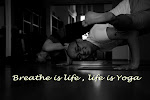Baddha means Bound or caught , Kona mean Angle. In this posture the knees are bent at an acute angle and are taken sideways to the ground. The heels touch each other near the perineum and the feet are caught by the hand. others English translations you might come across are- Cobbler Pose , Butterfly pose or Bound- Angle pose.
Regular practice of this pose increase the flow of blood to the abdomen , pelvis and back. It helps to treat arthritis of the knee , hip and pelvis joints. The pose is a boon to women as it tones the kidneys , alleviates urinary and uterine disorders , prevents sciatica and hernia. It also strengthen the bladder and the uterus as well as relieves menstrual pain and checks heavy.
A group of senior practitioners male and female alike use Yoga as a daily prescription for maintaining health. It is Yoga to help them in the management of their health issues such as low energy level , the hip replacement , the Arthritis, pre & post menopause discomfort,Parkinson's Disease and so on. Through the help of BKS Iyengar 's techniques, allow them to sit and stand freely and maintain the overall wellbeing . They are able to enjoy their life in retirement. Some of them in the group even become yoga teachers to help others with similar problems . Suza Francina , 61 years old Iyengar Teacher compiles each of their individual experiences and solutions , makes into an inspirational Yoga book - the new yoga for healthy aging.
Two seated poses - Baddha Konasana ( Bounded - angle pose) and Upavistha Konasana (Seated wide angle pose ) - are prescribed as the daily yoga vitamin ; Joints become stiff through incorrect or under or never use ,is especially important in later life when movement tends to become slow and difficult. Therefore , even after a meal that you still can do this pose- Baddha Konasana, ideally you should be seat with this at least for 2 to 3 minutes. over period of time, slowly increase up to 5 minutes. This serves as your MDR ( minimum daily requirement) to maintain a healthy knee and the hip joints.
The common problem ;
The trunk tend to slump backward and the chest collapses and the shoulder stooping
Elevate the buttock higher with folded mat or / a block as figure ( 4 ) will help you keep your back straight and sit comfortably in this pose and this modification will be easier for tight hips people. check if your knees level higher than your hipbones as figure ( 8 ) , if so , then you need to use the props.
Practice points to Observe in the following;
1) Extend the groins toward the Knees as figure (5)
2) Press the sides of the shin bones down as figure (5)
3) Roll the outer thigh out and down and keep the stretch evenly as figure ( 5 )
4) The firmer the grip of the hands on the feet , the better the lift of the trunk as figure ( 6 )
5) Press your heels firmly together and spread the toes as figure ( 6 )
6) Extend the trunk from the navel upward ad figure ( 7)
7) Keep the shoulder broad and the shoulder blade tucked in as figure ( 7 )
8) Feel the Kidneys pressed in as figure ( 7 )
Deepen the Pose;
This variation you can try provided your knees and outer thigh are closer to the floor. you can stretch a bit deeper by placing a block under the feet. and keep the stretches even both folded leg.
Solution with Kurunta;
The vertical wall gives a solid support for the back, your shoulder blade can be easier to press in , and the position of the Sacrum will not slump down. elevate higher the hip for inflexible people if necessary as figure ( 10 ) , In addition, with the help of the upward traction form the upper rope, the upper body can be efficiently lifted and the evenness of the stretch along the side body can be achieved and the entire spine are being spaced out , the arms and the lymphatic node in the armpit can be stretched properly as Figure ( 11 ). The good thing about Kurunta is that it is flexible yet adjustable to any desirable amount of stretch or the intensity you look for. Alternatively hold the stretching belt in your hand if the rope unavailable. Be remembered that you should observe the same points when holding in the final position as Figure ( 5 ) , ( 6 ) & ( 7 ).




















































0 comments:
Post a Comment